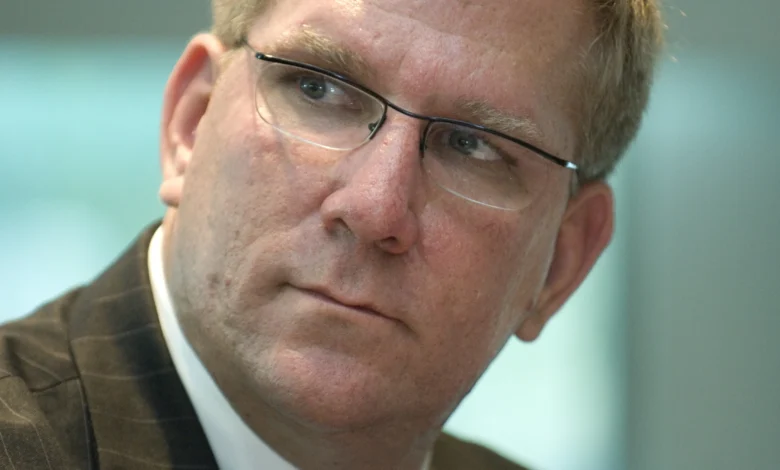
Bill McGinley Selected by Trump for White House Counsel Role
Donald Trump has named Bill McGinley as the new White House Counsel, adding a vital member to his potential future administration. The White House Counsel’s role is one of the most important legal positions in the executive branch that guides presidential powers and administrative decisions.
McGinley’s appointment shows Trump’s readiness to return to the West Wing. His exceptional experience as Cabinet Secretary makes him well-suited for the role. The White House Counsel handles many responsibilities that include advising on executive orders, overseeing ethical compliance, and developing Trump administration’s legal strategy. McGinley’s background, responsibilities, and this appointment’s implications are the foundations of this piece.
McGinley’s Background and Qualifications
William McGinley has spent over two decades at the intersection of law and politics in Washington, D.C. He started his legal career at the Republican National Committee (RNC) as Deputy General Counsel, where he provided important guidance on campaign finance and ballot access matters.
McGinley’s distinguished career includes several high-profile positions:
- General Counsel to the National Republican Senatorial Committee
- Partner at international law firms, including Jones Day
- Assistant to the President and Cabinet Secretary in the White House
- Outside counsel for election integrity at the RNC
During his time as Cabinet Secretary in the first Trump administration, McGinley led the Office of Cabinet Affairs. He served as the main liaison between the White House and the Cabinet of the United States. His role involved organizing Cabinet meetings, coordinating communications, and implementing policy across federal departments.
McGinley has been deeply involved in presidential campaigns and played key roles in multiple Republican National Conventions. He led the delegate whip team during the 2016 convention and acted as counsel to the 2012 Convention Committee on Rules and Order of Business. His work with national convention delegate processes started in 1996, which shows his extensive experience in presidential politics.
McGinley joined Holtzman Vogel and continued to advise clients on political law compliance and election integrity matters before accepting his nomination as White House Counsel.
Key Responsibilities of the White House Counsel
The White House Counsel’s Office leads all presidential legal operations and protects the presidency’s constitutional powers. This office serves as the presidency’s lawyer, not the president’s personal attorney. Its responsibilities go beyond traditional legal counsel.
The White House Counsel’s Office handles these most important functions:
- Protecting presidential powers and constitutional privileges
- Managing executive and judicial nominations
- Ensuring White House staff follows federal ethics rules
- Working with the Department of Justice on legal matters
- Reviewing executive orders and presidential statements
Legal issues need constant watchfulness, especially when they affect policy and political decisions. The Counsel’s Office acts as a command center when crises emerge. It provides quick legal guidance and charts the strategic direction. Today’s political environment brings intense scrutiny and fast-moving news cycles. The White House Counsel must stay aware of what happens across the executive branch.
The office’s constitutional authority within our separated government system is vital. The Counsel connects the White House with the Justice Department. This relationship ensures proper communication channels while law enforcement decisions remain independent.
Trump’s Statement and Expectations
President-elect Trump announced his new White House Counsel appointment with confidence. The 78-year-old former president emphasized McGinley’s capabilities, stating:
“Bill is a smart and tenacious lawyer who will help me advance our America First agenda while fighting for election integrity and against the weaponization of law enforcement.”
Trump praised McGinley’s role in his election victory as the Republican National Committee’s outside counsel for election integrity. His administration plans major changes in departments of all sizes when he returns to office.
The position brings unique challenges, as shown by Trump’s first term White House counsels’ experiences. Pat Cipollone and Don McGahn faced complex situations and became key witnesses in federal investigations. Cipollone and his deputy Patrick Philbin gave testimony about the January 6, 2021 events, but a Supreme Court ruling on presidential immunity later excluded them from the case.
McGinley’s appointment fits Trump’s strategy to build a team dedicated to his “America First” agenda. This move follows recent appointments in national security and environmental protection leadership positions.
Implications for Trump’s Second Term
McGinley’s appointment as White House Counsel could reshape Supreme Court Supreme Court nominations if Trump wins a second term. Trump already placed three justices on the bench during his first presidency. A second term might let him add two more justices to strengthen the conservative majority.
The White House team is taking shape with several core positions announced:
- John Ratcliffe as CIA Director
- Mike Waltz as National Security Adviser
- Pete Hegseth as Secretary of Defense
- Marco Rubio as potential Secretary of State
McGinley will do more than handle judicial nominations. He will help implement Trump’s America First agenda and tackle election integrity issues. His role as White House Counsel puts him at the center of policy execution and legal planning, especially when dealing with what Trump calls the “weaponization of law enforcement.”
Trump’s new administration blends seasoned former officials with fresh faces. McGinley’s time as Cabinet Secretary during Trump’s first term makes him well-suited to direct executive branch operations and advance the administration’s goals.
Bill McGinley joins Trump’s potential future administration as White House Counsel. His proven expertise comes from his previous role as Cabinet Secretary and his strong background in election law. McGinley understands presidential powers deeply and has managed complex legal matters at the highest government levels, which makes him ready for the work to be done. Trump shows his steadfast dedication by choosing seasoned professionals who support his administration’s priorities.
McGinley will help shape the legal framework of a possible second Trump presidency. He becomes essential when dealing with executive authority and policy implementation. His selection, among other experienced officials in key positions, shows careful preparation for future challenges. Trump’s team arranges strong administrative leadership that stands ready to turn his vision for America into reality.







[…] Bill McGinley: White House Counsel‘s Role […]
[…] This bold move, which covers potential federal offenses spanning a decade, tests the limits of presidential authority. It also reveals deep political and social fractures in American […]